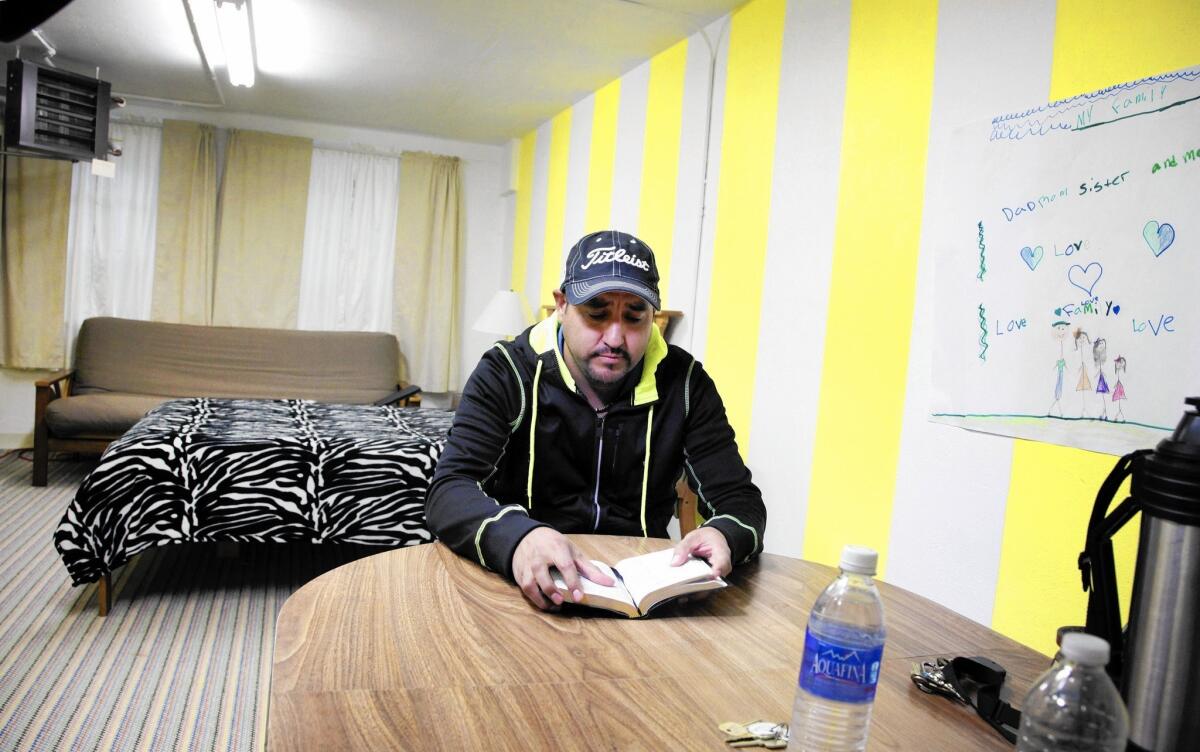In Denver church, one immigrant resists deportation order

- Share via
Reporting from DENVER — Arturo Hernandez has spent the last month in a church basement not far from the state Capitol here, doing puzzles, reading and fretting over his future.
Some days he’ll open the door a crack just to feel the sun on his face, but it only reminds him of a life he no longer has.
“I never imagined I’d end up in a place like this,” he said. “The hardest part is when my wife and kids visit and then go home and I’m here alone.”
Hernandez, 42, has lived in the country illegally for 15 years. After four years of petitions and appeals, Immigration and Customs Enforcement slapped him with a deportation order Oct. 26. But instead of leaving, he sought sanctuary inside the First Unitarian Society of Denver.
“Everybody thinks they only deport criminals, but most are just like me,” said Hernandez, who owns a contracting business and has a daughter who is a U.S. citizen. “We have never been a burden on the government, never been on welfare, nothing.”
He chose sanctuary rather than simply vanishing into the population because he believes in his case.
“It’s important for me to fight this legally and not just disappear,” he said, speaking in both English and Spanish. “I don’t want to live in hiding, worrying that every traffic stop will send me back to Mexico.”
The sanctuary movement began in 1982, when Southside Presbyterian Church in Tucson began taking in immigrants fleeing civil war in Nicaragua, El Salvador and Guatemala. Churches nationwide joined in, hoping to change U.S. foreign policy, which often supported autocratic regimes throughout Central America.
The tactic, which was based on the ancient concept of houses of worship offering havens, gradually faded from use, but immigration advocates say there are still eight people in sanctuary in the U.S.
“They are raising awareness and serving as the voices of millions who continue to live in the shadows,” said Sarah Launius, a paralegal who works with sanctuary cases at Southside Presbyterian, noting President Obama’s decision to lift some deportation orders will affect some, but not all, people living in the country illegally. “The deportations will continue.”
Hernandez, his wife and their 4-month-old daughter arrived in Colorado in 1999 on tourist visas that later expired. They lived in a mobile home in the Denver suburb of Thornton.
Life was normal until 2010, when Hernandez got into a shoving match at work after telling a man not to walk on wet ceramic tiles he had just laid down.
“He began yelling racial insults and tried to push me,” he said. “I pushed back and was arrested.”
After discovering his legal status, authorities turned Hernandez over to ICE, which ordered him deported. Meanwhile, a jury acquitted him of all charges surrounding the altercation.
He appealed his deportation order, saying it would cause extreme hardship to his wife and two children — a second child was born in the U.S. Every appeal was rejected and final deportation orders issued.
“I was listening to the radio one day and heard about sanctuary, so I contacted the church,” he said.
Jennifer Piper, coordinator of the Metro Denver Sanctuary Coalition, warned that it wouldn’t be easy. “I was very honest about the sacrifice sanctuary requires,” she said, noting that participants cannot leave the premises, they are expected to share their stories and “there are no guarantees.”
But ICE has a policy of not making arrests in places of worship, so Hernandez is safe, though he’s also in limbo.
On the day before Obama’s announcement, he looked a bit lost inside the cavernous church. A few Spanish-language television crews had come and gone and it was now just him and the pipe organ.
“I try to stay busy as much as possible,” Hernandez said with a shrug. “I read and play Sudoku.”
Local churches have given him food, and his brother is tending his contracting business.
His wife, Ana Sauzameda, 40, is taking it hard.
“My girls are used to having two parents around,” she said quietly, perched on his bed in the church basement. “I want us both to be a presence in their lives.”
For church Pastor Mike Morran, the case epitomizes the flaws in the immigration system.
“Arturo is everything an immigrant should be,” he said. “He’s hardworking, a business owner, pays taxes, has a clean criminal record. Everyone should want a person like Arturo in their neighborhood.”
For now, Hernandez is staying.
“I hope Obama will fix this problem,” he said. “If not, maybe I’ll have to leave.”
More to Read
Sign up for Essential California
The most important California stories and recommendations in your inbox every morning.
You may occasionally receive promotional content from the Los Angeles Times.










